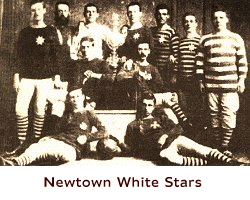Route to the Final
Newtown White Star
| Round | Opposition | Score | Location |
|---|---|---|---|
| 1st | All Saints (A) | 2–0 | Shrewsbury |
| 2nd | Llangollen (A) | 1–0 | Llangollen |
| 3rd | Bangor (N) | 2–2 | Wrexham |
| Bangor (N) | A–A [2] | Chester | |
| SF | Newtown (N) | 1–1 | Oswestry |
| Newtown (A) | 3–1 | Newtown |

Wrexham
| Round | Opposition | Score | Location |
|---|---|---|---|
| 1st | Corwen (A) | 2-0 | Corwen |
| 2nd | Friars School (A) | 3-1 | School Ground, Bangor |
| 3rd | Bye | ||
| SF | Oswestry United | 2-0 [3] | Salisbury Park, Wrexham |